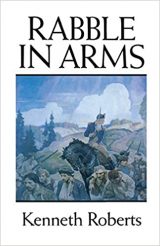 The tumult of recent events have fostered a desire to read more classic American historical fiction. To remember the stories we once told about ourselves instead of those others tell us we must be, at a time when all sides tell us to be anything other than what we are. To learn once more of such things as the tragedy of brother against brother in the clash of the Blue and the Gray in Michael Shaara’s The Killer Angels. Or why the name of Benedict Arnold still brings tempers to a boil. For that, once must first understand the heights from which America’s most notorious traitor fell.
The tumult of recent events have fostered a desire to read more classic American historical fiction. To remember the stories we once told about ourselves instead of those others tell us we must be, at a time when all sides tell us to be anything other than what we are. To learn once more of such things as the tragedy of brother against brother in the clash of the Blue and the Gray in Michael Shaara’s The Killer Angels. Or why the name of Benedict Arnold still brings tempers to a boil. For that, once must first understand the heights from which America’s most notorious traitor fell.
Once proclaimed “the greatest historical novel written about America,” Kenneth Roberts’ 1933 novel, Rabble in Arms, today often gets dismissed as an Arnold apology, set in the heady months of Arnold’s successes before his imminent betrayal. The second of the Arundel trilogy, Rabble in Arms picks up where Arundel ends, with the shambles of the failed Quebec campaign of the Revolutionary War. General Arnold must somehow rally the undersupplied, demoralized men and incompetent politically-appointed officers into a force capable of stopping British General Burgoyne’s impeding invasion of New York. Arnold and Burgoyne will eventually cross swords twice at a battlefield that rings throughout American history:
Saratoga.
But many smaller, personal stories are the warp and woof to the grand tapestry of history. Our eyes for these is Maine sea captain Peter Merrill, a recent volunteer to the Patriot cause, in no small part to the harassment his family receives for his brother Nathaniel’s perceived Loyalist sympathies. Peter is assigned to General Arnold, who soon uses the Arundel youth for his expertise on land and at sea in the fight for Lake Champlain. Through Merrill, we learn of the deprivations suffered by American soldiers through arduous marches with little food and even less relief from disease and flies. The events of the armies and ad hoc navies serve as a backdrop for more personal events affecting Peter. For Nathaniel has been seduced by a British spy, a real Milady de Winter, who is trying to set brother against brother and is willing to use the affections of her own niece to do so. Will Peter survive to see Arundel once more with his bond with his brother intact?
I’ll be honest. The full review of Rabble in Arms is taking time. Not because of any difficulty or deficiency to the prose, but because I find myself slowing down to savor every page. It also helps to have access to secondary materials such as the Townsends YouTube channel to unlock period custom, dress, and menu. For, like it’s contemporaries in the Argosy historical pulps, Rabble in Arms assumes the reader has a familiarity with the time period and needs no explanation of what a flip or a bateau might be. A refreshing change, to be sure, compared to the constant exposition that is common today. Unlike the pulps, though, Roberts takes a more leisurely pace through battle and feat of endurance that paradoxically heightens the stakes more than stomping on the Argosy gas. And all through this tapestry of historical events and personal story, of shot and spray and intrigue, Peter drops little pearls of wisdom hard earned that a young reader would do well to heed.
It might not be pulp, weird, or science fiction, but sometimes the past is the greatest adventure of all. I hope you will join me soon for the full review.
Nathan,
I’m looking forward to your full review of this wonderful book. Thank you for reminding readers of Kenneth Roberts. It’s a shame he’s not better known today among the general public.
“Peter drops little pearls of wisdom hard earned that a young reader would do well to heed.” This is one of the joys of Roberts, I think – as well as his meticulous recreation of the period and his characters. I read his “Lydia Bailey” for the first time this year and found many comments worth noting. One of my favorites is: “I raged at the idiocy of pleading for tolerance when actually the world has always needed intolerance: intolerance of mediocrity, of cruelty, of laziness and stupidity and clumsiness, of knavery and trickery, intolerance of ignorance, of gluttony, of waste. I thought of the intellectual slavery in which so many men live, governed by nincompoops….” Hmmm. I might just have to grab my copy of “Rabble” for a re-read.